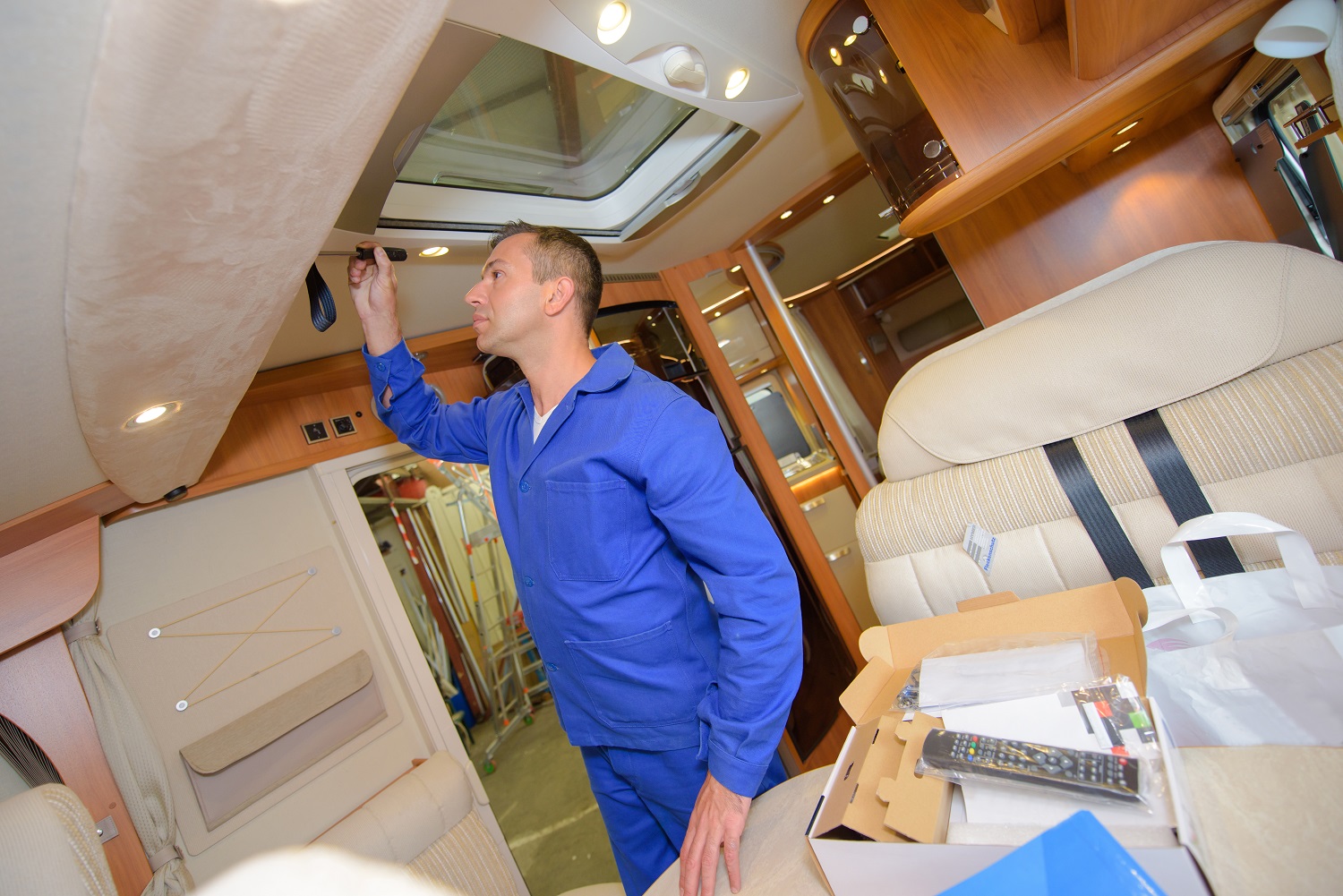
When COVID forced changes to his job and shut everything down, Henri Boodèe retired and decided it was a good time for him and his wife to buy an RV to enjoy some travel.
Yet, after buying the rig, Henri had difficulty understanding all the systems onboard. He also had a tough time finding specific material on how appliances work that was not written exclusively for advanced technicians.
He attended a five-day course offered by the National RV Training Academy (NRVTA) in Athens, Texas. During that week, Henri opted to take additional training to learn how to inspect RVs.
“All dealers tell you they do inspections as part of a pre-delivery evaluation,” he explained. “Some are a little more involved than others. But, generally, the dealership picks an overworked technician, who may or may not be trained in conducting inspections. They give him a clipboard with a checklist and tell him to make sure everything works. The technician checks off items and goes back to fixing another RV, or completes six to eight similar inspections that day.
“Consumers discovered that, even after a dealership claimed to have inspected an RV, many problems were found that required the RV to come back for repair,” he added. “Dealerships honored the repair warranty, but service times really lagged. Sometimes it took months just to get an appointment and months more to receive the right parts.”
RV buyers deserved better. So, the National RV Inspectors Association (NRVIA) was formed in 2017 to support people who conduct thorough inspections of new or used RVs, and connect them to consumers seeking inspectors.
“Inspectors give buyers as much information as possible about what was likely the second-largest purchase of their lives,” Henri explained. “That way they could make an informed decision about whether to purchase the unit or not.”
Hiring a certified inspector gives consumers more confidence the person performing the inspection knows what he or she is doing, he added.
“To become certified, someone has to have the knowledge, training and experience to perform duties to standards established by NRVIA,” he explained. “Savvy consumers recognize the difference between a certified and non-certified professional.”
Locator map
Henri’s primary source of new clients is the National RV Inspectors Association (NRVIA) website itself, where consumers enter a zip code or city and state into the locator feature and see lists of inspectors in that area.
As a member of the association, Henri can update his location to reflect not only where he is at the moment, but where he will be when he travels.
“There is a timer function that allows me to note that, in three weeks, I will be in the Phoenix area. People who happen to be looking for an inspector at that time will see my profile,” Henri explained. “I can even set up multiple locations so that it shows I am working in the Chicago area as well as southern Wisconsin and Milwaukee. That way people in all those areas can feel free to contact me because I am not restricted to one geographic area. It all depends upon how far I am willing to travel.”
Henri knows some inspectors who performed multiple inspections for clients. In fact, they are willing to fly the inspector to a specific location to complete an evaluation.
Remote inspections
Henri is willing to travel 100 miles round-trip without imposing additional fees on customers. Some clients are willing to pay a mileage fee and even cover the cost of overnight hotel stays to get him to do an inspection.
“When you’re about to buy a high-end Class A valued at $750,000, then spending a little extra to get a qualified inspector to do an inspection is a pittance,” he said.
“If you live in upper New York state and found the perfect RV, but it’s in Florida, chances are good you’re not going to drive all that way just to look at the unit,” he explained. “So you engage an RV inspector in the Florida area to look at the unit for you.”
Private sales vs. dealership
People buying used RVs from private sellers need to have those units inspected, too, he explained.
“The sellers aren’t generally trying to pull something over on a buyer; however, few people want to hear their baby is ugly,” said Henri. “Because it’s their baby, they don’t think anything could possibly be wrong with it. But when I ask private sellers when was the last time they crawled on the roof, I often get a blank look back.”
Because repairs caused by water damage are often very expensive, Henri said many buyers will walk away from an RV that shows evidence of leaking.
“If I find any water damage, I will immediately stop the inspection and call the client to find out if I should continue,” Henri explained. “Many times, the buyer just tells me to forget about it and I adjust my fee accordingly.”
When it comes to the level of inspection performed, Henri makes no distinction between a private seller or RV dealership. He thoroughly evaluates each RV regardless of who is selling it. It can take six hours or longer to complete a top-to-bottom, inside-and-out inspection.
“When buying an RV, not many people will turn on the refrigerator and stick in a thermometer to make sure it gets cold,” said Henri. “But, if they don’t that, it could be unsafe to store food. Replacing a residential refrigerator in an RV requires a slideout or front windshield to be removed. Those can be expensive repairs.
“Another often overlooked item is RV tires. Many private sellers feel that just because they put 10,000 miles on the RV, the tires are still good to use,” he added. “However, the National Tire Safety Board recommends people replace tires every six years. They could still look great, but be in danger of blowing out. Replacing four tires on a standard trailer is an unexpected $2,000 repair.”
No perfect RV
Henri said inspectors do not coach customers to walk away from any RV that is not perfect because they all have problems. However, buyers need to be fully aware of any potential issues.
For example, there is a big difference between knowing a roof may need to be resealed and knowing that it is rotted to the point it must be replaced, he noted.
“The RV industry is kind of like the Wild West. Although every state has lemon laws protecting car buyers, and consumer agencies will help people who encounter a problem when buying a house, those protections do not exist for RV buyers,” said Henri.
“Most lenders treat an RV like a car purchase. They do not require inspections, but just give the buyers a loan and expect them to make payments whether or not there is a problem,” he added. “At least with house loans, lenders demand inspections before they write you a check for your mortgage. RV buyers are left to fend for themselves to get problems fixed – while still making monthly payments.”
Final advice
Although many buyers will sign a contract and drive away in their RV that day, Henri said they are taking a huge risk by doing so.
“Whether it is a purchase order prepared by an RV dealership or a contract presented by a private seller, buyers should always ensure these words are written into the document, ‘This sale is subject to my final inspection and approval. Without my final approval, I can receive a 100% refund on my deposit,’“ Henri said. “Then keep that copy in a safe place.
“There are some unscrupulous dealerships that take a deposit and get people to sign a purchase order. But if something is wrong with the RV, the firm keeps the deposit claiming the company didn’t cancel the sale, rather the buyer did,” he explained. “Some deposits can be more than $1,000. Having that clause in a purchase order can protect you from losing your deposit if there are significant problems with the RV.”
People can connect with Henri by visiting www.expertrvi.com or by calling (815) 347-5862. For more information about the National RV Inspectors Association (NRVIA), visit to nrvia.org/locate, email [email protected] or call (855) 472-9948.
